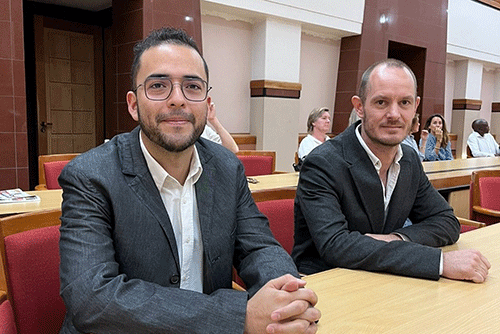Five judges of the Supreme Court ruled on Monday that the Windhoek High Court was wrong when it ordered the Ministry of Home Affairs and Immigration to grant citizenship to the child of same-sex couple Phillip Lühl and partner Guillermo Delgado, who hails from Mexico.
The boy, who was born via surrogacy in South Africa, was initially denied entry into Namibia by home affairs but was later allowed, pending the outcome of the matter.
Windhoek High Court Judge Thomas Masuku on 13 October 2021 ordered that the ministry issues the minor with a Namibian citizenship certificate by descent within 30 days from the ruling.
The child is the firstborn son of Namibian citizens Lühl and Delgado.
The ministry, however, did not take it lying down and appealed the decision in the Supreme Court.
The appeal was heard by a full bench consisting of Chief Justice Peter Shivute, Deputy Chief Justice Petrus Damaseb, judges of appeal Sylvester Mainga and Dave Smuts, as well as Acting Judge of Appeal Theo Frank.
“After studying the said reasons, we have decided to appeal the ruling of the High Court, and an appeal was noted in the Supreme Court, setting out the reasons for our belief that the High Court erred in law and fact,” executive director Etienne Maritz said in a statement.
The court dismissed the counter-application by the ministry to subject Lühl to a DNA test to prove the child’s paternity. The Supreme Court, however, did not make mention of a DNA test in its ruling.
In the judgment prepared by Judge Damaseb in concurrence with the other judges, the Supreme Court found that the High Court failed to consider that the child in question was never registered in his country of birth (South Africa) at a Namibian diplomatic mission or a trade representative, alternatively in Namibia within a period of one year or a longer period approved by the minister – and in terms of applicable laws of Namibia.
According to Judge Damaseb, there was no compliance on the part of Lühl and Delgado in terms of section 2 of the Citizenship Act.
The section makes it a precondition for the acquisition of citizenship by descent for a child born outside of Namibia that its birth must be registered at any Namibian agency within the country of birth or alternatively upon entry into Namibia at home affairs.
“Since the birth of YDL (the child) was not registered in terms of the Citizenship Act, it was not competent for the High Court to grant the relief it did to the respondent (Lühl), the appeal judges stated and continued that the application should have been dismissed on that basis alone.
Judge Damaseb made no order as to costs for both the High Court case and the appeal.
The home affairs ministry’s spokesperson Margaret Kalo said the ministry is still considering the judgment. “We are, therefore, unable to comment at this stage”.
Lühl was represented by Uno-Katjipuka-Sibolile from Nixon Marcus Public Law Office and the minister by senior counsel Griffits Madonsela SC, assisted by Jabulani Ncube from the Attorney General’s Office.
– rrouth@nepc.com.na


